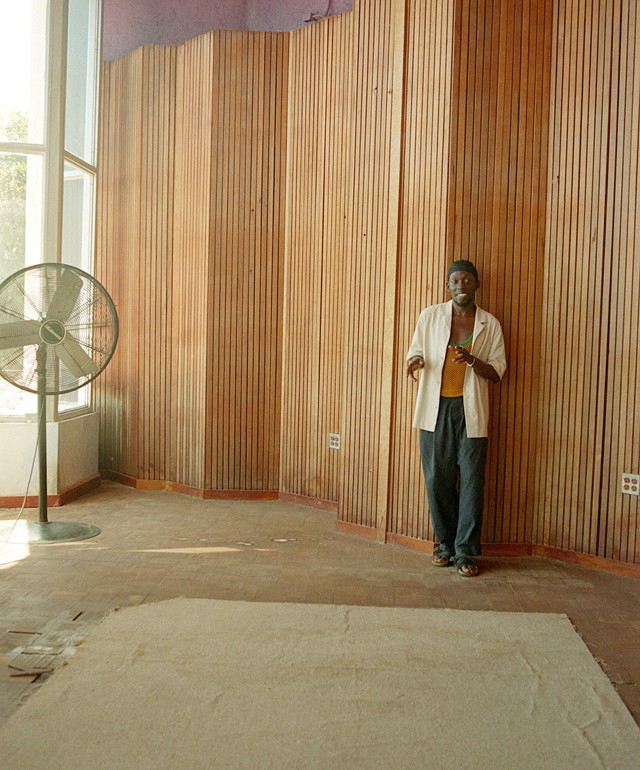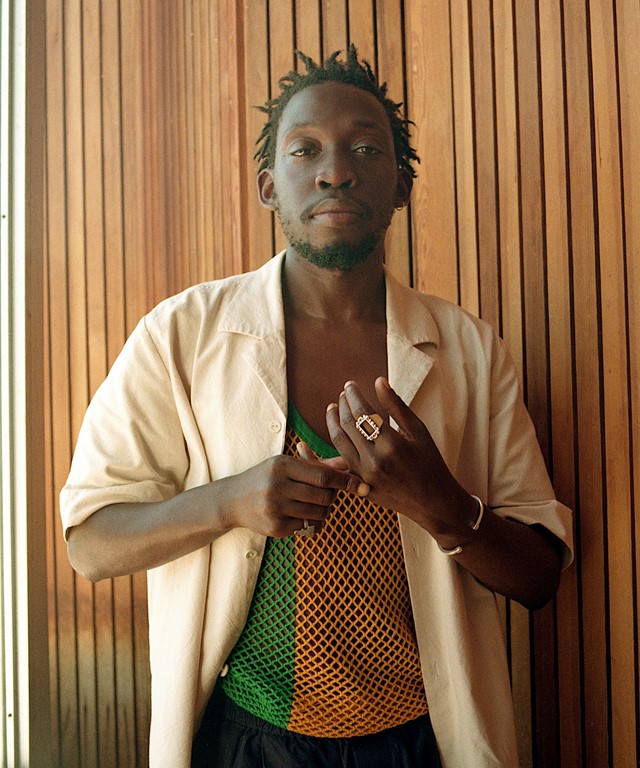AnOther meets the rising DJ and music curator, who unpacks his relationship to music and his vision for Touching Bass – the club night-cum-label-radio show and musical movement he has steadily built
Growing up, Errol Anderson had a series of epiphanies that changed the way he thought about music, culture and life itself.
Brought up in Bow, east London, with Jamaican and Grenadian parents, he was immersed in music and socialising. “Music was always next to food and food was always next to dance and dance was always next to people,” he recalls of family parties. His first true love outside of his parents’ music was grime. “When JME’s Boy Better Know started a phone network, this ingenious marketing plan of reaching people, from that moment, I was like, ‘whoa, what an incredibly innovative way to reach people around something that is so integral to my life’.”
Years later, seeing Theo Parrish DJ for the first time was another light bulb moment. “That unlocked something in me in a very, very different way,” he says. “There was a real bravery about the way he played - he was so fluid genre-wise. It changed my perspective as to what a DJ can be, like the DJ can be an archaeologist, piecing together various different parts of musical history.”
All of these moments can be linked by a thriving sense of togetherness and community and this is something that is integral to the ethos of Touching Bass, the club night-cum-label-radio show and musical movement that Errol, Alex Rita and a host of others have been steadily building for years.
Touching Bass started as an interview and mix series on Noisey, before Anderson took a brief, and culture clashing, stint at a major record label, and then began life as a club night in 2014 with help from friend, Amon Brown. He also held a role as lead music programmer for Boiler Room, spearheading the UK jazz explosion in its early stages, collaborating with Saul Williams across London, New York and Miami’s Art Basel (including an appearance from Yasiin Bey) and introducing the likes of Khruangbin, Anderson Paak, Nick Hakim and many more to millions online.
At the same time, he began to run a series of Touching Bass nights that eschewed convention. Typical club spaces were out, instead they utilised spaces like a Senegalese restaurant or a Jamaican bakery, attempting to capture that community and family-driven spirit that had defined his childhood.
“It needed to be bigger than just a party,” he says. “In a world where the word community is getting thrown around so much, it’s really forced us to question what community can actually be. That goes back to being Caribbean where there was a symbiosis of all these things happening. It wasn’t just one thing.”
There was no social media, no phones on the dance floor and a wide-open music policy that aimed to celebrate Black music in all forms, from jazz to dub, garage to hip-hop, and jungle to dancehall. The spaces became a place for meaningful exchanges that transcended simply going out. “From an anthropological level, I was thinking about how important physical space was, and is, to the incubation of music,” he says. “Grime had its youth clubs, garage had its Versace in high-end clubs, drum and bass had Blue Note. They all had their physical spaces where the music was able to incubate.”
This space naturally expanded, growing into an excellent biweekly NTS radio show. Rita began a RBMA-like live event and discussion series called Speaking in Sound and a record label was formed, releasing the likes of cktrl and Clever Austin, with a two-years in the making “flag in the ground moment” 22-track compilation, Soon Come, arriving this July.

Being a label was always baked into the philosophy of Touching Bass. “I had this vision of it being like an ecosystem,” Anderson says. “The ethos and the mission statement was very much about: I want to get people together. I want intention. I want it to be centred around music and for it to be a community; but I also wanted it to be a label.”
So, is a musical movement that avoids social media in favour of an old-school rave text service that encourages no mobile phones, and therefore filming, something of an antidote to the experiences he encountered when running events for Boiler Room? “Hmmmm,” he ponders for a moment. “I wouldn’t necessarily call Touching Bass an antidote,” he says.
“I loved working at Boiler Room but I wanted Touching Bass to re-energise this idea of a space that could just be. It didn’t need to depend on being online or social media. Those things are just tools. A hammer is a tool – you can use a hammer to put a painting on a wall or use it to do damage. One of the negative by-products of Boiler Room is when you stick a camera in front of people’s faces some people are automatically self-conscious.”
The text service is another layer of community added into the mix. “I’m sure there aren’t many promoters out there that have their people texting them,” he says. “That kind of personal relationship has done wonders for what our dance floor looks like. People feel like they belong to something.”
Belonging to something has always been key to Anderson because for a period, during the end of his grime years, he knew what it felt like to not have that. “I started to deviate and listen to other stuff,” he says. “Aphex Twin, Hessle Audio, Georgia Anne Muldrow. As a result, I almost became quite alienated because I was into this stuff. I lacked a community. So doing this kind of thing with a group of people with a shared intention was so, so important to me.”
After working in various areas of the music world, Anderson feels his role is ultimately as a music curator. He’s expanded into film music supervision, co-curating the soundtrack to Jenn Nkiru’s incredible 2019 Black To Techno experimental documentary. In 2021, he made his Frieze London debut alongside Alex Rita, developing an immersive live experience in response to Ibrahim Mahama’s Lazarus at White Cube. Most recently, he stepped in as lead music curator and project manager at 180 Strand, ushering in projects with visionaries including Gabriel Moses, Julianknxx and Wales Bonner.
“What I’ve been doing over the past few years is all music curation,” he says. “It’s a direction I want to move more into. I look at people like Benji B and what he’s doing for Louis Vuitton [soundtracking Virgil Abloh’s final show] as something I really want to do. To work experientially with musicians, people from various artistic mediums and institutions.”
As for the wider future of Touching Bass, it once again goes back to that same ethos that underpinned everything from his childhood upbringing to the genre-busting unifying joy of Theo Parrish. “Moving forward it’s all about more connection and more community.”
Touching Bass release the 22-track compilation, Soon Come, via streaming platforms and double 12” vinyl on July 1 – listen here.
